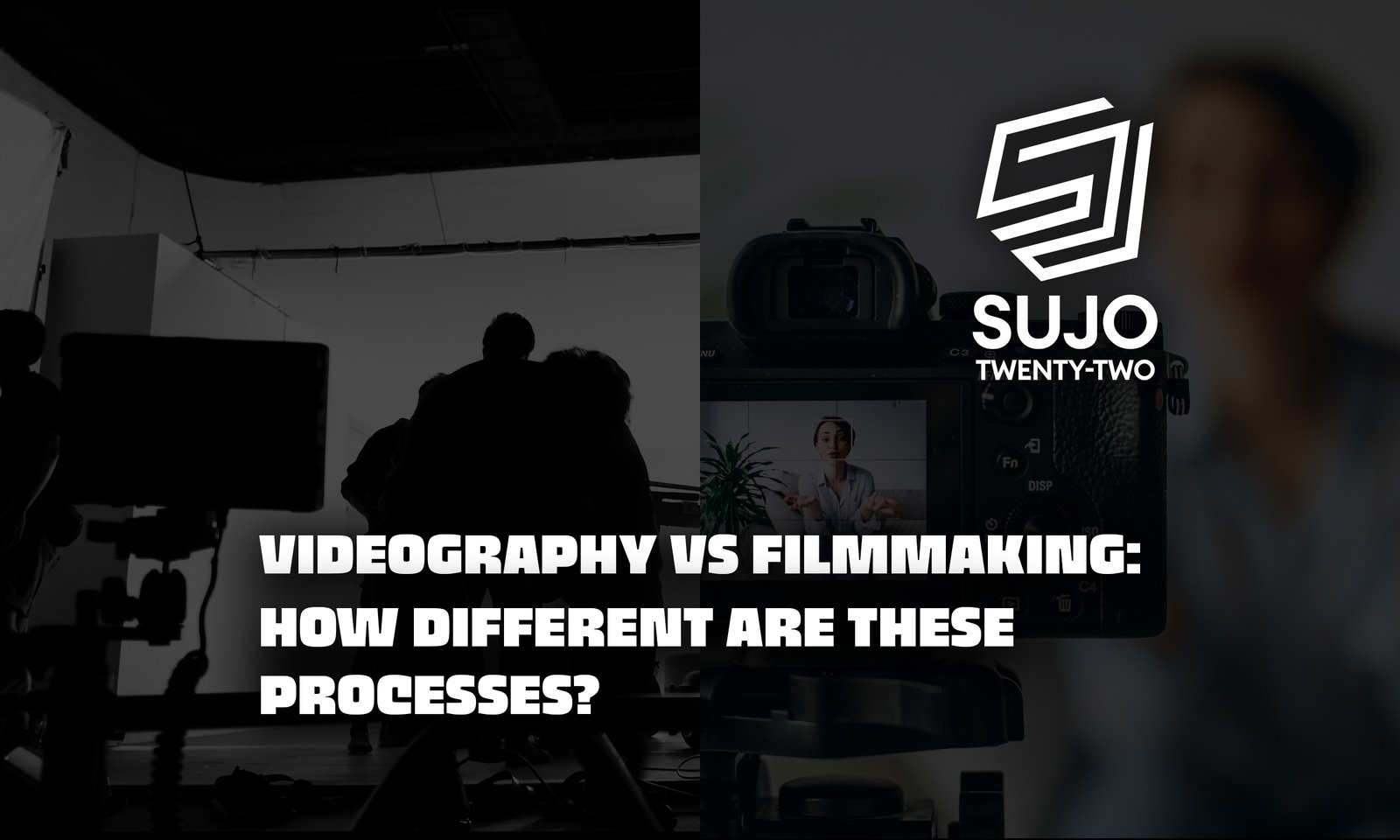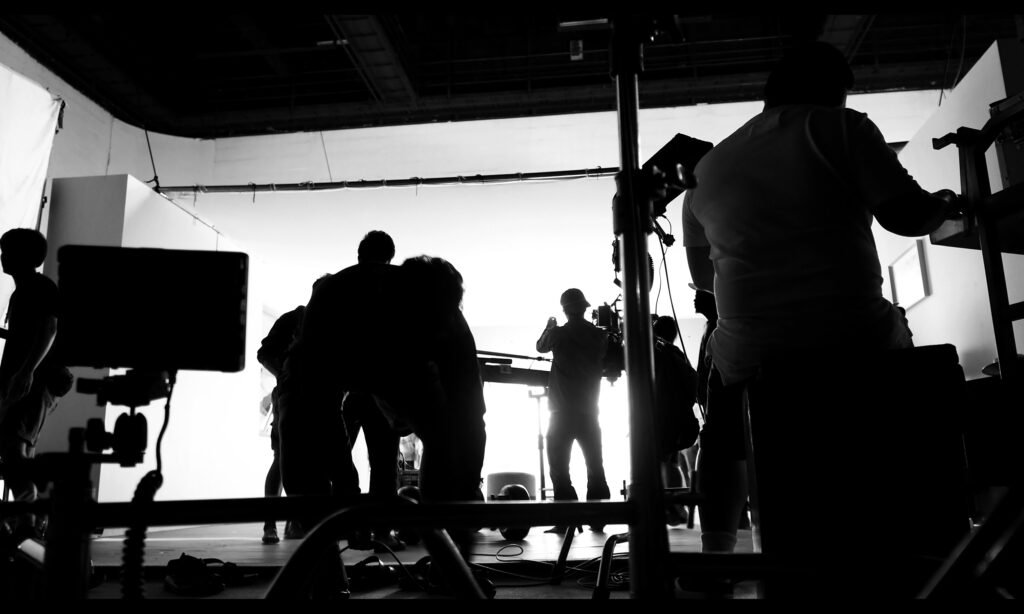
Videography and filmmaking are two very different processes. While both industries have their own sets of challenges, they also share some common traits that make them better suited for certain brands than others. In this post, we’ll explore how these two industries differ and compare how their operations. We’ll also explore which one might be more effective in conveying your brand’s story—and why!
What Is Videography?

Videography is the practice of recording moving images on video. The term “videography” can be used to describe both the process or art, of filming and editing videos as well as the finished product. This includes post-production services too.
Traditional definitions of videography extend to just being present at the event and capturing the activities that take place there. Even in advertisement videos, for example, a hotel, videography might simply include taking a video of the hotel at sunset, edits to achieve a sleek final look, and sharing on their preferred platforms. However, there is no storyline or content-oriented script aiming to evoke feelings.
It is important to note that although it seems as if videography is just taking a video on specific video equipment without storytelling, the concept has evolved a lot now. More production companies are now encompassing the filmmaking process and creating branded videos that aim to convey stories and evoke emotion. However, on the surface videography is just that, capturing live events on a camera.
What Is Filmmaking?

Filmmaking is the process of recording motion pictures. Filmmaking refers to a film, video, or television production that involves a high artistic direction of which professional video production is just a small aspect. This could be feature films, music videos, and other content-oriented scripts created from scratch.
Filmmaking can be broken down into three steps: planning, shooting, and editing. The first step in this process is planning what should go into your movie based on its theme and storyline; this includes creating an outline with details about each scene as well as deciding how long each segment should last before moving on to other aspects such as lighting design or sound effects.
Once you have created all of these elements for your video then it’s time to start shooting! This means hiring actors/actresses who will portray characters within your script while also adding cinematic effects such as varying camera movement and special effects if needed (for example smoke). After shooting all necessary footage has been filmed then editing begins to include the most important scenes to fit the storyline.
Filmmakers can also be called motion picture camera operators however people operating cameras aren’t the only talent involved in filmmaking. The film production crew is more intensive and involves people, scriptwriters and creative directors who don’t have to touch the camera at all.
The Difference Between Videography and Filmmaking for Brands

Videography is used to record events, like corporate events or product launches, while filmmaking focuses on creating original content from scratch. This means that many companies use both types of video production in their marketing campaigns but not all brands can afford to hire film crews full-time or dedicate an entire budget toward producing this type of content!
There are many other differences between the two types of video production, which we have explored below.
The Intensity of Emotive Storytelling Differs in Brand-Oriented Videography and Filmmaking
The intensity of emotional storytelling in branded filmmaking is generally more personal and intense, seeking to promote a brand by consumers feeling attracted to it. However, times have evolved to the point where a great video production company will ensure your brand has a personalized video with the aesthetics promised by filmmaking – not just any old video but one that showcases your products in an engaging way.
The difference between these two types of videos also lies in their focus on specific areas such as simple captures for training videos in terms of videography although this is not a primary difference. Filmmaking is more about telling stories through visuals; it allows you to show what makes your business different from other businesses out there in today’s marketplace – this way people can see how they benefit from having this type of service/product provided by yours!
Filmmaking Is a Niche In Videography
Videography is a broad term that can describe any type of video production. However, filmmaking is a niche within the scope of videography where there are artistic procedures in place to present an item, place, or any content in a manner that is appealing to the viewer along with recording the video.
For example, a videographer at a wedding might just be someone capturing the entire event. However, if you want your wedding captured from a mystical perspective, you would go to a filmmaker that can capture the event in that essence and light. If you want to shoot a music video with the strategy and content provided by the person you are hiring, you need the niched-down videographer, also known as the filmmaker.
The Process of Recording Differs in Videography and Filmmaking
The process of recording differs in videography and filmmaking. Videography is more passive, while filmmaking is more active. This means that you have to plan everything in advance and record it as planned. Filmmaking on the other hand strikes emotion but in a planned way. The process manipulates the setting and atmosphere to tell a story in a certain way; which includes more than just using costumes, choosing an ideal shoot location, or additional elements included for aesthetic appeal.
This is not to say that there is no editing process after recording in videography, but rather the process in prior influences how the video is captured. This means that the difference between the two processes lies more in the process before and during the recording of the video than after it.
Filmmaking Is Not for Every Brand
It is important to understand that filmmaking is not for every brand. Some brands require simple corporate videos with not-so-intensive processes, which will do the job just fine. As long as it can be shared online, a video of this type does not have to be appealing or emotive. Even if not exceptional in terms of attractiveness or storytelling, the results achieved from the brand video will be sufficient to make a step forward even if there is no completely well-planned and put-together script.
The production value still remains high even without that touch of “Hollywood-style feature films” which is completely unnecessary for a corporate video, or similar videos. There are certain brands that can benefit from filmmaking but there are many that don’t need that intense process, and some that don’t have the liberty of the time taken for filmmaking.
The Cost of Videography and Filmmaking
The cost of videography and filmmaking is very different. The reason for this is that producing a high-quality video with a strong storyline involves more than just shooting the footage even though videography also includes editing, sound mixing, and post-production.
The Filming and Video Production Team
In filmmaking, the production process is more intense than in videography. Filmmaking requires a team that has extensive knowledge about all aspects of film production, with a goal to bring the video content director’s vision to life. The team must be able to shoot high-quality footage at any given time and deliver it on time while also bringing new ideas into their work. It is not the job of just a video camera operator or cameraman.
There is not just one person involved in filmmaking and it involves more roles, whether it is that of a content strategist, video producer, etc. This can be challenging if you have not been working in this field before but with proper training and experience, you can become successful at it as well!
This is not to say that there cannot be a one-person film crew because there can be, especially if it is video marketing for a small product launch that requires an outstanding story to promote the product. Generally speaking, a filmmaking video project is of a larger scale and extends to creating movies, music videos, etc.
The Blurred Lines Between Videography and Filmmaking

The blurred lines between videography and filmmaking are not just a coincidence. It’s because video production for brands specifically has evolved so much that, branded marketing and advertising videos are no longer simple product shoot videos. Filmmakers conveniently call themselves videographers when a job opportunity arises in that scope especially if they are comfortable with documenting videos whether a creative video production process is required or not.
On the other hand, videography itself is becoming better with your typical event videographer upgrading their equipment to include DSLR video cameras and other video graphics equipment to match the aesthetics of the current consumer and their preferences where a simple video with a classy or enjoyable atmosphere garnering more views and shares than just a recording of an event.
Should You Hire Videographers or Filmmakers?
The important question is, what type of video do you need and why do you need it?
A simple example would be wedding videographers. If you want wedding videography of the entire event simply recorded as it is for your memories, a videographer would be a perfect fit. Some wedding videographers have even upgraded to DSLR cameras to record the event in an aesthetic manner. The shortcoming of a DSLR camera is however that it can only record a certain amount of content, so if you want a wedding videographer to film the entire event, you’re at a loss.
On the contrary, if you want your wedding and its major moments to be captured and put together in a movie-like feel, a filmmaker is your ideal videographer. Depending on the feel you would like to go for, filmmakers can transform your wedding video to be just that, whether is romantic, fun, or magical!
Choose Video Production Services According to Your Need

Videography and filmmaking are two very different storytelling forms that can be used to tell a brand’s story. They both have their pros and cons, but in the end—it all comes down to what your brand needs. If you’re looking for a video production company that, does it all, down from simple videography needs to creative video production services crafted to invoke feelings, then SUJO Twenty-Two is the right fit for you. Contact us today to sort out your videography needs paired with the right touch of filmmaking!
FAQs
Cinematography is the process of actually capturing the moment in the perspective needed under appropriate lighting and other special effects according to the creative direction while filmmaking entails the entire process from pre-production planning to post-production editing, etc.
Yes, video editors are part and parcel of the videography process. They add cinematic effects and increase or reduce exposure, brightness, contrast, and other aspects that make the video appealing. This also includes arranging each shot to transition smoothly to the next frame, sound-mixing, and finally curating a complete package to achieve different brand goals like telling a story or delivering a message.



